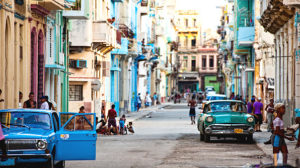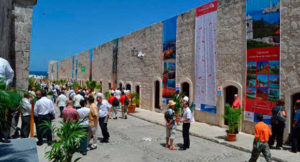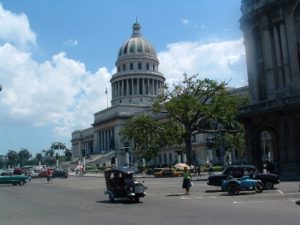The tourist euphoria experienced in the United States after the announcement of the opening of relations with Cuba in December 2014 has undergone a change of trend. Nine months after the start of regular flights between the Atlantic Coast and the island, three airlines have had to reduce their routes and one has suspended its services. The interest of the Americans to visit Cuba after 54 years of embargo has not been the expected one.
The airline giant United Airlines announced in March the reduction of 25% of its routes and the change of the aircraft that will continue flying to the island by smaller ones. So did Silver Airways, which will leave six of its nine weekly flights to Cuba, and JetBlue Airways, the first to open the route last August 31, which will decrease seats from 800 to less than 300. The most radical has been Spirit Airlines with the cancellation of its two flights daily and the abandonment of the business.
The initial optimism shown by US tourists confused airlines. With no previous data to base, they launched the conquest of 110 daily flights – 20 of them to Havana – arranged by the United States Department of Transportation. Half a year later, they had to give up. “There has been a speculative situation,” says Eddie Lubbers, founder of Cuba Travel Network, which has been operating in Cuba since 2004.
Other reasons have been the lack of hotel supply and the sudden increase in the prices of the rooms, taxis and the famous palates provoked by the growth of the demand in the last two years in Cuba.
The demand of the travelers has punctured, above all, in the airports of the secondary cities like Santa Clara or Camagüey. “There has been a correction of the market,” explains Popper.
Running Wild. A Bump in the Road.
That transformation that many nostalgic want to avoid is in full swing with the Spanish hoteliers as protagonists with the Canadians as secondary. Meliá, Iberostar, Barceló, NH and Globalia are some of the Spanish hotel giants in Cuba.
The first announced last January the opening of its biggest hotel in the world in the town of Cayo Coco, north of central Cuba, and last May the acquisition of eight hotels spread over the island with the Objective of promoting quality tourism.
This absolute control of the market is threatened with the entrance of new actors. The French hotel group Accor, owner of the Sofitel hotels, has just announced the construction of the first “superlux” in the middle of Havana’s Malecon.
These infrastructures will be necessary to accommodate the American tourists of the future. “The Spanish hotels are the most demanded,” says Popper, who highlights the high purchasing power of his compatriots who travel to other areas of the Caribbean. “Due to the increase in prices, many people prefer to stay in private homes,” says Lubbers, who foresees an increase in this type of accommodation.
Despite the bump, prospects for the future of United States tourism on the island remain very promising. The American online booking giant Expedia has been the last major tourist company to include Cuba with Barceló hotels among its offer. Tourism is gradually coming to Cuba, while the real opening is still pending policy and awaiting the path taken by Trump.
EL TURISMO SE DESINFLA TRAS LA EUFORIA DE LA APERTURA ENTRE EEUU-CUBA Y SU FUTURO CON TRUMP.
La euforia turística vivida en Estados Unidos tras el anuncio de la apertura de las relaciones con Cuba en diciembre de 2014 ha sufrido un cambio de tendencia. Nueve meses después del comienzo de los vuelos regulares entre la Costa Atlántica y la isla, tres aerolíneas ha tenido que reducir sus rutas y una ha suspendido sus servicios. El interés de los estadounidenses por visitar Cuba tras 54 años de embargo no ha sido el esperado.
El gigante aeronáutico United Airlines anunció en marzo la reducción de un 25% de sus rutas y el cambio de las aeronaves que continuarán volando a la isla por otras más pequeñas. Lo mismo hizo Silver Airways, que dejará en seis sus nueve trayectos semanales a Cuba, y JetBlue Airways, la primera en estrenar la ruta el pasado 31 de agosto, que disminuirá los asientos de 800 a menos de 300. La más radical ha sido Spirit Airlines con la cancelación de sus dos vuelos diarios y el abandono del negocio.
El optimismo inicial mostrado por los turistas estadounidenses confundió a las aerolíneas. Sin datos previos en los que basarse, se lanzaron a la conquista de los 110 vuelos diarios -20 de ellos a La Habana- dispuestos por el Departamento de Transporte de Estados Unidos. Medio año después, han tenido que desistir. “Se ha producido una situación especulativa”, considera Eddie Lubbers, fundador de Cuba Travel Network, que opera en Cuba desde 2004.
Otras razones han sido la falta de oferta hotelera y el repentino aumento de los precios de las habitaciones, los taxis y los famosos paladares provocados por el crecimiento de la demanda en los últimos dos años en Cuba.
La demanda de los viajeros ha pinchado, sobre todo, en los aeropuertos de las ciudades secundarias como Santa Clara o Camagüey. “Por ahí se ha visto la corrección del mercado”, explica Popper.
Apuro Inversor y un Bache en el Camino.
Esa transformación que muchos nostálgicos quieren evitar se encuentra en pleno desarrollo con las hoteleras españolas como protagonistas con las canadienses como secundarias. Meliá, Iberostar, Barceló, NH y Globalia son algunos de los gigantes hoteleros españoles en Cuba.
La primera anunció el pasado mes de enero la apertura de su hotel más grande del mundo en la localidad de Cayo Coco, al norte de la región central de Cuba, y el pasado mes de mayo la adquisición de ocho hoteles repartidos por la isla con el objetivo de impulsar el turismo de calidad.
Este control absoluto del mercado se ve amenazado con la entrada de nuevos actores. El grupo hotelero francés Accor, dueño de los hoteles Sofitel, acaba de anunciar la construcción del primer “super lujoso” hotel en pleno Malecón habanero.
Estas infraestructuras serán necesarias para alojar a los turistas estadounidenses del futuro. “Los hoteles españoles son los más demandados”, comenta Popper, quien destaca el alto poder adquisitivo de sus compatriotas que viajan a otras zonas del Caribe. “Debido al aumento de los precios, mucha gente prefiere quedarse en casas particulares”, comenta Lubbers, quien prevé un aumento de este tipo de alojamientos.
A pesar del bache, las perspectivas para el futuro del turismo procedente de Estados Unidos en la isla sigue siendo muy prometedoras. El gigante americano de las reservas online Expedia ha sido la última gran compañía turística en incluir Cuba con los hoteles Barceló entre su oferta. El turismo llega poco a poco Cuba, mientras la apertura real sigue aún pendiente de la política y a la espera del camino que tome Trump.
Agencies/Bez, Spain/Internet Photos/Excerpts/Arnoldo Varona/TheCubanHistory.com
THE CUBAN HISTORY, HOLLYWOOD.



 @ CUBA TOURISM is deflated after the opening euphoria. Trump changes expected. + EL TURISMO SE DESINFLA tras la euforia de la apertura con Cuba y su Futuro con Trump.
@ CUBA TOURISM is deflated after the opening euphoria. Trump changes expected. + EL TURISMO SE DESINFLA tras la euforia de la apertura con Cuba y su Futuro con Trump.





